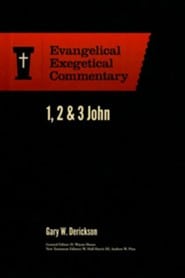The Evangelical Exegetical Commentary series is a well-reviewed reference collection that discusses recent biblical scholarship from an evangelical perspective.
Published by Lexham Press, EEC volumes thoroughly explain the meaning of Scripture in the ancient world as well as it’s application and relevance for Christian living today.

EEC authors discuss history, literature, and bible-wide themes, as they interpret the text and explain it’s significance. Authors consist of evangelical professors and scholars.
Which commentary series is best for your purposes? See Best Bible Commentaries: Top 50. Based on aggregate reviews.
 | Please subscribe to my YouTube channel to see weekly videos on Bible commentaries. |
Evangelical Exegetical Commentaries (EEC): Reviews
John H. Walton, Professor of Old Testament, Wheaton College, on Esther:
“Tomasino’s treatment of the book of Esther is discerning, judicious, balanced, nuanced and, because of all that, eminently useful to scholar as well as pastor.
All readers will find enlightening and informative observations and analysis that will enhance their study.
From detailed treatment of the Hebrew text to attention to the theological and devotional implications of the text, there is something here for everyone. This is now my top pick for an evangelical commentary on Esther.”
D. A. Carson, Research Professor of New Testament, Trinity Evangelical Divinity School, on Ephesians:
“Usually full-length commentaries devote much of their space to surveying and evaluating the secondary literature — a useful but rarely a fresh or exciting venture. Baugh’s commentary is different.
Every page reflects years of exacting study of primary sources — classical literature, inscriptions, the first-century historical context (especially the history of Ephesus, gleaned from both archaeological and documentary evidence), coupled with a profound commitment to biblical theology.
This does not mean he spends so much time on the historical and literary contexts that he fails to study the letter itself: far from it. Rather, Baugh’s impressive learning is in service of understanding Ephesians. Baugh’s comments are invariably measured, judicious, the product of informed and careful scholarship, lightly worn.
Mercifully, the excellent scholarship comes in readable prose, making this a thoroughly interesting and stimulating work. This is now unquestionably the best technical commentary on Ephesians.”
Author interview from the EEC series on Best Bible Commentaries
S.M. Baugh on Ephesians: (click to see full Q & A)
Preview: “The fatherly grace of God in Christ lavished upon us through the Holy Spirit. In short, Ephesians is just soaked in the Gospel. There are times when working on this book I would have to stop and thank the Lord for the privilege of handling this rich word of grace.”
Mark Keown on Philippians: (click to see full Q & A)
Preview: When I was a young Christian, I set out to do theological training thinking I could know everything (typical youthful optimism). I have learned that I can’t. Commentary writing takes you deep into a text, digging, turning over rocks, pausing, exploring.
As you do, links explode from the text into other Scripture, your own life, the historical setting, the surrounding culture, and so on. Every Greek word and phrase is literally a repository of possibilities.
Doing this commentary challenged me to go to another level, and it is great. I encourage all who can to learn the biblical languages. Discipline yourself, take time to dig, grow, learn, and it is amazing what will come.
Volumes in the Evangelical Exegetical Commentary Series
The links below go to Amazon using each book’s exact ISBN.
Exodus 1-18 – Eugene Carpenter | Exodus 19-40 – Eugene Carpenter
In the book of Exodus, the promises to the patriarchs begin to reach fulfillment: Yahweh takes a people for Himself and dwells among them as their God.
In this volume, Eugene Carpenter interacts with the most current scholarship and analyzes the Hebrew text to trace this important theme through Exodus.
Throughout his commentary, Carpenter gives readers his own translation, demonstrates how the theology of Exodus interacts with the rest of the Bible, and offers suggestions for applying Exodus to the Church.
Eugene Carpenter (1943–2012) was Professor of Old Testament, Hebrew, and Biblical Theology at Bethel College. Carpenter served as a pastor and teacher in a variety of church and ministry settings.
1-2 Samuel – Harry A. Hoffner Jr.
This volume of the Evangelical Exegetical Commentary represents the final work of renowned scholar Harry A. Hoffner, Jr. An expert Hittitologist, Hoffner brings his understanding of ancient Near Eastern cultures to the text of 1–2 Samuel, providing a commentary that is sure to make an impact for years to come.
First and Second Samuel pick up where the book of Judges leaves off, continuing the narrative sweep of the history of Israel. They cover the life of the prophet Samuel, the rise and fall of Saul as King, and the reign of King David.
Hoffner examines these books in their historical context, he discusses the many characters found throughout, and he considers how they anticipate a coming perfect king, Yahweh’s true Anointed One.
Harry A. Hoffner Jr. (1934–2015) was John A. Wilson Professor of Hittitology Emeritus at the University of Chicago. He was considered a world expert on ancient Near Eastern culture specializing in the Hittite language, history, and civilization.
Ezra-Nehemiah – Israel Loken
By analyzing Ezra’s and Nehemiah’s elements of narrative and the historical backgrounds, Israel Loken explains how and why God’s people rebuilt Jerusalem and changed their way of worship.
Loken examines the views of other scholars before drawing persuasive conclusions about what convinced God’s people to follow Him, once again, with their entire beings. Loken then tells us what the characters and events in Ezra and Nehemiah teach us about worship, life, and God.
This rare combination makes this contribution both scholastic and applicable.
Israel Loken is chair of the Bible and theology departments at the College of Biblical Studies in Houston, Texas. He regularly leads tours to Israel.
The story is a familiar one, made popular by Sunday School teachers, novels, and movies: her people threatened with extinction, Queen Esther must summon the courage to approach the Persian King Xerxes in order to save the Jews.
But what is the real message of Esther? In this commentary, Anthony Tomasino closely examines the Hebrew text to explore the motifs of feasting, sovereignty, assertiveness, and reversal in the book of Esther.
He also explores its connection with the celebration of Purim, the theme of the invincibility of the Jews, and the conspicuous absence of any mention of God.
Anthony J. Tomasino is director of the biblical studies program and associate professor of Bible, Old Testament and Hebrew at Bethel College. He is the author of Written Upon the Heart: The Ten Commandments for Today’s Christian and Judaism before Jesus: The Events and Ideas that Shaped the New Testament World.
Song of Songs – A. Boyd Luter
The biblical book that deals most extensively with romantic and sexual wisdom is the Song of Songs.
In this commentary, A. Boyd Luter argues that the Song contains an inverted parallel structure that divides it into seven sections, taking a young couple from their initial longings and expressions of affection for each other, to their wedding day, and on to the various struggles that threaten to derail their love.
For each section, Luter comments on the text and background of the Song and provides helpful suggestions for how it might be preached and applied today.
A. Boyd Luter is adjunct online professor of New Testament at Liberty Baptist Theological Seminary. He has authored several books, including Looking Back, Moving On, God behind the Seen: Expositions of the Book of Ruth and Esther, and Inspired Preaching: A Survey of Preaching in the New Testament.
Luter has written numerous articles and book reviews for various publications, including Bibliotheca Sacra, Journal of the Evangelical Theological Society, Faith and Mission, Journal of Pastoral Practice, and Cr
Lamentations – Abner Chou
This EEC volume on Lamentations examines the language of intense lament and loss over Jerusalem. Old Testament expert Dr. Abner Chou provides detailed discussions of the authorship, date, and historical background, as well as textual and genre issues.
Before beginning verse-by-verse commentary, Chou provides context for key theological issues present in the book, making it a comprehensive and valuable work for any study of Lamentations.
Abner Chou is assistant professor of biblical studies at The Master’s College and Seminary. He has been involved in research for commentaries, books, and journal articles, and has contributed papers to the Evangelical Theological Society.
In this commentary on Paul’s letter to the Ephesians, S.M. Baugh identifies the main theme as “unity in the inaugurated new creation.” He then walks the reader through the indicative first part of the letter, which sets forth various aspects of the Christian faith, and the imperative second part, which calls readers to a lifestyle based on these truths.
Along the way, Baugh examines ancient sources to provide a first-century perspective, while also interacting with recent scholarship and ultimately asking what this letter means for the modern-day believer.
S. M. Baugh is Professor of New Testament at Westminster Theological Seminary, California. He is the author of New Testament Greek for Interpreters and A First John Reader.
Philippians is considered one of Paul’s most encouraging letters. Mark J. Keown shows how Paul appeals to Christ’s exemplary acts of humility and sacrifice to encourage believers to live worthy of the gospel in every aspect of life.
He draws attention to the pastoral heart of the imprisoned Paul, who warns the Philippians against false teachers while calling them to demonstrate their imitation of Christ through a commitment to mission and “radical generosity.”
Through rigorous examination of the original Greek text and engagement with the latest scholarship, Keown delivers an in-depth commentary on Philippians that captures the message of Paul’s encouraging letter for believers today.
Mark J. Keown (ThD, Laidlaw College) is a Senior Lecturer in New Testament at Laidlaw College in Auckland, NZ and is the author of Congregational Evangelism in Philippians as well as numerous essays and journal articles.
He is also an ordained minister and served at Greenlane Presbyterian Church from 1997–2003.
Philemon – Seth M. Ehorn
In this volume, Seth M. Ehorn takes the uncommon stance that slavery is not the central issue of Philemon; instead, God’s providential work is. According to Ehorn, this is seen in the themes that Paul addresses throughout his letter: reconciliation, forgiveness, love, and faithfulness—attributes that Christ exhibited.
Ehorn adopts the view that Paul wrote to his friend, Philemon, on behalf of Onesimus, Philemon’s runaway slave. As a “friend of the master,” Paul reminded Philemon of his Christian character, suggesting that he should continue to act accordingly.
By using and interacting with various interpretive approaches (such as discourse, rhetorical, epistolary, and sociological), Ehorn shows how Paul embodied Christ’s actions and how we can do the same.
Seth M. Ehorn is currently a doctoral candidate studying New Testament language, literature, and theology at the University of Edinburgh, New College. Prior to New College, he completed an MA in biblical exegesis at Wheaton College Graduate School in Illinois where he was awarded the Merrill C. Tenney Award for New Testament studies.
He has contributed several articles to the Baker Illustrated Bible Dictionary (forthcoming) and written many book reviews in academic journals.
1, 2, and 3 John – Gary Derickson
In this volume, Gary Derickson explores how John communicates his pastoral concerns in his three epistles. Interacting with the most recent scholarship, Derickson focuses on John’s message and concerns rather than following the common theory of a Johannine school and secessionist polemic.
He distinguishes pastoral and polemical elements within John’s message and recognizes John’s own assessment of his readers’ faith. By encouraging his readers to express God’s love through being actively involved in each other’s lives, John shows that he is not concerned with how we possess eternal life but with how we express it as we relate to God.
Gary Derickson is ministry division chair at Corban University. He has published articles in Bibliotheca Sacra, ETS Studies Series, The Master’s Seminary Journal, and The Journal of the Grace Evangelical Society. He contributed to The Nelson’s Complete Study Bible and is co-author of The Disciplemaker: What Matters Most to Jesus.
Jude calls believers to stand firm in their belief in Jesus’ messiahship, even when various forms of rebellion occur around them. In this comprehensive volume, Herbert Bateman examines the historical, cultural, and literary context of Jude’s letter, identifying the “godless” as Zealots and other Judaeans caught up in an insurgence against Rome.
At the same time, the letter admonishes readers to extend mercy to those who inadvertently rebel against God, both inside and outside the church.
Herbert Bateman runs the Cyber-Center for Biblical Studies, and he serves as an adjunct faculty member for Liberty Seminary.
He has also served on the faculty at Southwestern Baptist Theological Seminary, Moody Bible Institute, Grace Theological Seminary, Taylor University of the Upland, Tyndale Theological Seminary in Amsterdam, the Netherlands, Asian Theological Seminary in Manila, the Philippines, and Dallas Theological Seminary. He has a BS from Philadelphia Biblical University, a ThM Dallas Theological Seminary, and a PhD Dallas Theological Seminary.

